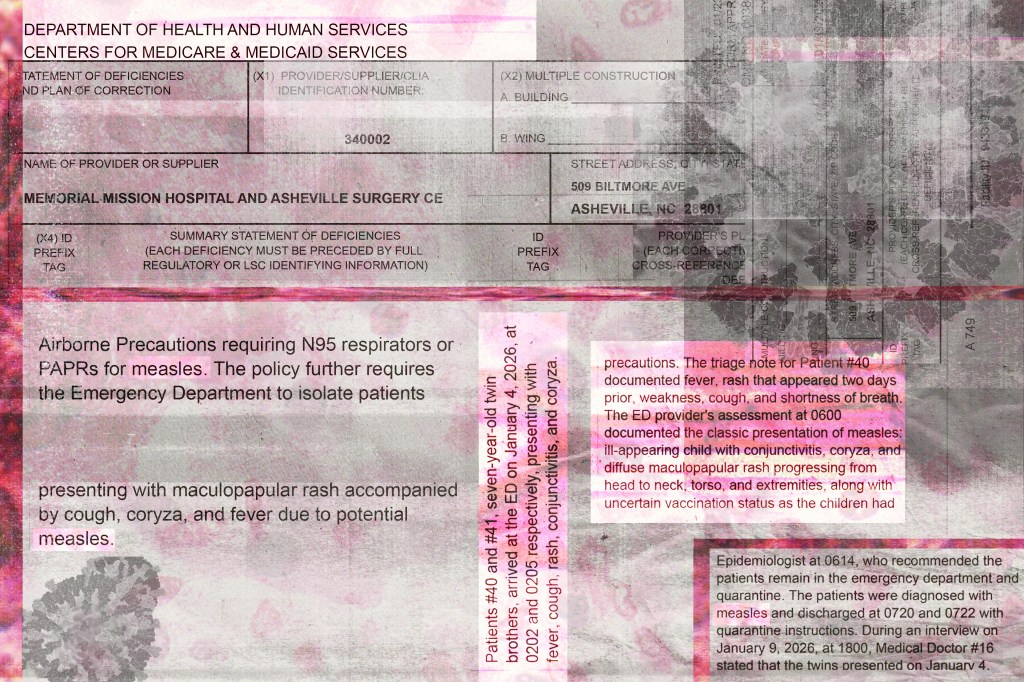For the most part, Keyanna Jones and her husband thought they knew what to expect when their daughter Chloë had eye surgery last fall.
Even Chloë, who was in kindergarten, had a good understanding of how things would go that day. Before the procedure, a hospital worker gave her a coloring book that explained the steps of the surgery — a procedure to correct a condition that could have eventually interfered with her vision.
“Chloë is very smart,” Jones said. “She reads at almost a third-grade level now, and she’s only 6.”
Jones did her homework, too. With no pediatric ophthalmologists near their home in Wentzville, Missouri, who would take their insurance, she asked the insurer to cover Chloë’s out-of-network care as if it were in-network. The insurer agreed to let her see an out-of-network specialist.
Chloë made it through surgery without a hitch. Jones said her daughter enjoyed a few popsicles at the hospital before going home.
“ I slept with her every night because she was so worried she would wake up and not be able to see,” she said. “But it healed beautifully, and she was absolutely ready to go back to school.”
Then the bill came.
The Medical Procedure
Chloë was born with a droopy left eyelid, a condition known as ptosis. To correct the problem, an ophthalmologist surgically lifts the eyelid, preventing it from disrupting the patient’s line of sight.
Ophthalmologists, unlike optometrists and opticians, hold medical degrees and can provide advanced eye care, including surgery.
The Final Bill
$15,188, including $10,382 for the procedure and $2,730 for anesthesia. Initially, insurance paid just $1,775.79, leaving the Jones family owing $13,412.21 — until Chloë’s uncle, who had recently finished his term as a state senator, asked a colleague to look into it.
The Problem: Phantom Insurance Approval?
Months before Chloë inhaled bubblegum-scented anesthetic at Cardinal Glennon Children’s Hospital in St. Louis, Jones discovered that it can be hard to find a pediatric ophthalmologist. The doctor recommended by Chloë’s pediatrician wasn’t contracted with their insurer, UnitedHealthcare, and the closest in-network specialist was in Wisconsin, hundreds of miles away.
So Jones requested what’s called a network gap exception, under which the insurer would cover the recommended doctor’s services as in-network.
Before the surgery was scheduled, she received a letter saying UnitedHealthcare had approved her request “because currently there isn’t a doctor, health care professional, or facility in your area to provide these services.” The letter listed several medical billing codes for eye services and said they would be covered “at the network level.”
About a week later, the insurer sent a prior authorization letter approving Chloë’s surgery.
But UnitedHealthcare declined to pay most of the surgery bill, covering it as out-of-network. With approval letters in hand, Jones said, she did not understand why the insurer apparently was not honoring its agreement to cover her daughter’s treatment.
In fact, the similar-looking letters granted different kinds of approval.
UnitedHealthcare’s gap exception approved Chloë’s exams before the surgery as in-network. But in its prior authorization letter for her surgery with the same doctor, the insurer said only that it would cover it — without offering network discounts.
After receiving the bill, Jones contacted the insurer online, but she said a representative told her there was no record of its approval to cover the surgery as in-network.
“At that point, I didn’t even know what to do,” she said. “I’m like, ‘This is crazy.’”
She said she sent over a copy of one of the approval letters, which was on the company’s letterhead, but a representative told her the letter hadn’t come from UnitedHealthcare.
“They said, ‘You saw this surgeon, they’re not covered and you didn’t have permission, so, no, we’re not going to pay,’” Jones said, recounting the phone call.
An insurance representative told Jones she owed more than $13,000 because of “a balance billing issue.” That meant the Jones family would have to pay the $13,000-plus balance.
Spokespeople for UnitedHealthcare confirmed the company provided a gap exception and prior authorization for Chloë’s care. Eric Hausman, a spokesperson for UnitedHealth Group, said in a statement to KFF Health News that “we empathize with anyone who finds themselves in the unfortunate situation of being balance billed by an out-of-network provider for an amount significantly above market rates, and without any advance knowledge.”
Maryanne Wallace, a spokesperson for SSM Health, the health system that includes Cardinal Glennon Children’s Hospital, provided a statement that said SSM followed “standard patient billing procedures.”
“Occasionally, an insurance company may process a claim as an out-of-network service, which can result in a balance being billed to the patient,” the statement said.
The Resolution
Jones said she was blindsided by the big bill. She tried to fix the problem on her own, she said, keeping track of every interaction with the insurer and the hospital. She filed appeals with UnitedHealthcare.
Nothing helped — until she reached out to her brother Caleb Rowden, who had been a Missouri state senator for eight years after serving four years in the state House.
“ I’ve never used my brother’s political clout for anything,” she said. “I actually hate politics.”
Rowden told KFF Health News that he reached out to Travis Fitzwater, the state senator representing his niece’s district. Jones contacted Fitzwater’s office, too, and sent a complaint to Missouri Attorney General Andrew Bailey.
Fitzwater said his office did no more for Chloë than it would for any constituent.
“We’re not going to take a lot of credit for the result of it, because we didn’t ask for anything other than a resolution, so that everybody can be at peace and move on with their lives,” he said in an interview. “We just did what we do every day.”
After Fitzwater’s staff contacted the hospital and the insurer, representatives from both separately called Jones and notified her that UnitedHealthcare had paid the bill in full.
In the end, Chloë’s family paid nothing for her procedure — not even a copay.
The Takeaway
When it comes to insurance approvals, read the fine print carefully; “covered” does not mean an insurer will pay, let alone at in-network rates.
Rowden and Fitzwater said reaching out to your elected representative’s office can help. Advocating for constituents is part of their job.
“They usually have an open line of communication with these insurance companies and hospitals,” Rowden wrote in an email. “They may not always be able to get to a positive outcome since every situation is a little different, but they can usually get you to a next step.”
Jones is grateful that her brother was able to help, though she acknowledged that she probably would not have called him without a nudge from their mother. “I think I would still be fighting,” she said.
Bill of the Month is a crowdsourced investigation by KFF Health News and The Washington Post’s Well+Being that dissects and explains medical bills. Since 2018, this series has helped many patients and readers get their medical bills reduced, and it has been cited in statehouses, at the U.S. Capitol, and at the White House. Do you have a confusing or outrageous medical bill you want to share? Tell us about it!
KFF Health News is a national newsroom that produces in-depth journalism about health issues and is one of the core operating programs at KFF—an independent source of health policy research, polling, and journalism. Learn more about KFF.
USE OUR CONTENT
This story can be republished for free (details).









